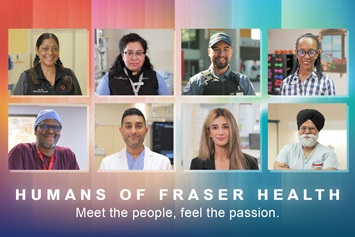
Learn from Fraser Health Registered Nurse Lauren Thomas's experience of having tough yet critical discussions with your patients, residents and clients about their end-of-life health care wishes, in light of COVID-19.
We understand that these may be scary times with worries about the future. People who think through their health care wishes and what is important to them are often feel less anxious, and more in control.
Advance Care Planning is about identifying your values and beliefs that will guide care decisions down the road, and plan for the unknown yet inevitable. Rather than ticking boxes about the types of care you’ll accept, the focus shifts to, “what gives my life meaning and will this intervention support it?” These conversations aren’t easy, and they can be more easily discussed when a serious or urgent care decision isn’t at stake.
Lauren Thomas, registered nurse, works with Fraser Health’s Advance Care Planning team. Previously, she worked with the Heart Failure Outreach Support Team and Cardiac Services at Surrey Memorial Hospital and Jim Pattison Outpatient Care and Surgery Centre. Here, she saw many patients admitted and re-admitted for heart failure, caught in a repeat cycle of admissions and “fixes” that give temporary life extensions.
“I saw a patient during what must have been his tenth hospital admission in a year for heart failure. He had also come to be dealing with depression, through his ongoing health struggles,” says Lauren. “In our many conversations about Advance Care Planning, we never got past having final arrangements in place for after his death. Discussions about what was most important to him in life were not held.”

Lauren Thomas
Nurse - Community Health, Advance Care Planning
Lauren couldn’t get to what she describes as the “meat” of the conversation until she realized that no one had shared a critical detail about his condition. No one had said “we can’t fix you.” Without a clear understanding of diagnosis and prognosis, the truly tough discussions weren’t being held.
When it became understood that the fixes had run out, the conversation changed. The same questions were asked as before: what’s important to you as time runs short? What gives you meaning? But the answers were different, because the goals had changed. Within 48 hours, the patient chose to end medical interventions, and six days later, the patient had passed away.
This experience changed Advance Care Planning discussions and goals of care conversations into Lauren’s practice, and led to work by the interdisciplinary care teams to create strategies for successful conversations with all patients and their families. The earlier the discussions are held, the longer individuals can focus on living their lives and worry less about the uncertainty of death.
Follow the steps in the Advance Care Planning Framework for Health Care Providers (note: internal link - must be signed in to the Fraser Health network to access) to guide conversations with your patients.
For more information, visit fraserhealth.ca/acp, call 1-877-TALK-034 (1-877-825-5034) or email advancecareplanning@fraserhealth.ca.


